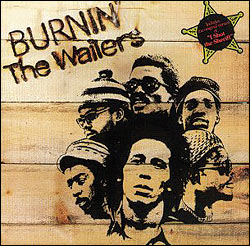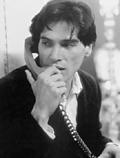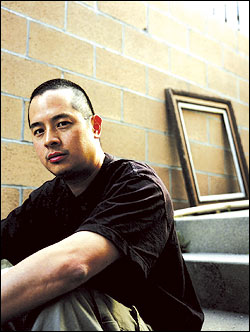Was it all really better before you were born? That case can certainly be argued, particularly since the election. But in terms of music, I tend to look forward as much as back—the greatest album of all time could show up in my iPod tomorrow, and I wouldn’t necessarily know it right away, since greatness tends to reveal itself over time. Still, it’s always worth giving it up to records and artists that have proved themselves over a longer span than pop’s normal cycle.
Take Michael Jackson, whose career has never until now been summarized as thoroughly as it might. The Ultimate Collection (Epic, $59.98), the new four-CD-plus-DVD box set that begins with the Jackson 5’s “I Want You Back” and continues through 2001’s Invincible, is the first of its kind—somewhat surprising for a guy who may be lost in a cloud of self-delusion and discomfiting accusations, but who really was, for a time, bigger than God. Since 1982’s Thriller blotted out all but the peaks of Jackson’s pre-solo career in the wider public memory, the first disc of Ultimate could compensate more than it does. Instead, it moves from “I Want You Back” through the amazingly lithe disco of “Shake Your Body (Down to the Ground)” (by the Jacksons, the name Michael and his brothers traded under when they moved from Motown to Epic in the mid-’70s) to pre-Thriller music both solo (four cuts from Off the Wall, Jackson’s—and disco’s—greatest album) and with the group (“This Place Hotel”). 1987’s Bad (whose title, as critic Greg Tate put it at the time, “accurately describes its contents in standard English”—he’s exaggerating, but not too much) is overrepresented; 1991’s underrated Dangerous is given its props. The healthy amount of extras—demos, previously unreleased material, a song from the IMAX ego-stroke Captain EO—make it perfect for Jackson fanatics, teen-pop completists, and armchair psychiatrists.
Long before Jackson usurped the role, the Beatles were the biggest thing in pop, and since John Lennon‘s death in 1980, they’ve only grown more mythic. Lennon’s solo career was pretty heroic itself—two great albums, a few spottier ones, and a terrific, if tragically foreshortened, return with 1980’s Double Fantasy. The new Acoustic (Capitol, $18.98) looks on the surface like a cynical repackaging of that legacy, but its alternate takes, demos, home recordings, and rehearsals tie together in a conceptually apt way—a set list for an MTV Unplugged that never happened, good renditions of excellent songs. Warped sound quality aside, the 1:17 “Well Well Well” provides a nice, bluesy counterpoint to the stomping electric charge of the six-minute version on Plastic Ono Band, and the version of that album’s “God” sounds unexpectedly churchlike, despite stating, “I don’t believe in Bible . . . I don’t believe in Jesus.” (He even throws in a sly traveling-minister-style intro before launching into the song.) And along with 1998’s Wonsoponatime, Acoustic is also a way to access noncanonical Lennon without shelling out for the four-CD Anthology box set from six years ago. Nice touch: The booklet’s lyric printout includes the chords above each line so you can play the songs yourself.
Lennon may occupy the most dorm-room wall space of any 20th-century musician. His chief competitors: Bob Marley & the Wailers, whose 1973 album, Burnin’, has just gotten the Deluxe Edition treatment from Tuff Gong/Island/Chronicles ($29.98). Nearly every song on the album is a more-or-less standard: “Get Up, Stand Up,” “I Shot the Sheriff,” “Burnin’ and Lootin’,” “Put It On,” “Small Axe,” “Duppy Conqueror,” “Rasta Man Chant.” This edition tacks on a pair of unreleased versions of “Get Up,” three other rare tracks, and on disc two, a never-before-issued 12-song live set from Leeds recorded Nov. 12, 1973.
Long before Lennon or Marley—long before rock and roll or reggae—the hot R&B of labels like Savoy Records were laying the blueprint for them. Stompin’ at the Savoy: The Original Indie-Label 1944–1961 (SLG/Savoy Jazz, $39.98) is a four-disc set of the Newark, N.J., label’s highlights, many of which are among the most important—and most fun—records of their era. Johnny Otis’ “Harlem Nocturne” is eternal: Otis “slowed down a honky-tonk tune until it had nothing to do with Harlem anymore, and instead it became the definitive soundtrack for every mean street down which every L.A. private eye ever walked,” as Steve Erickson put it in Los Angeles magazine. Slim Gaillard’s wonderfully loose “Slim’s Jam” was a meeting between bebop titans-in-the-making Charlie Parker and Dizzy Gillespie and Slim himself, a man who’d twisted even bop-talk so far around the bend that he must have seemed eccentric to Bird and Diz. (Gaillard later retired to an orchard farm near Tacoma before regularly touring Europe in the ’80s until he died in 1991.) Dusty Fletcher’s “Open the Door Richard” started a national craze that was the “Who Let the Dogs Out?” of its era—only way, way better musically. Even though Stompin’ diminishes some by the fourth disc—box sets have a habit of doing that—it’s still a hell of a lot more fun than most history lessons. And it doesn’t diminish that much—check Brownie McGhee’s stomping Chuck Berry rewrite, “Anna Mae.”








